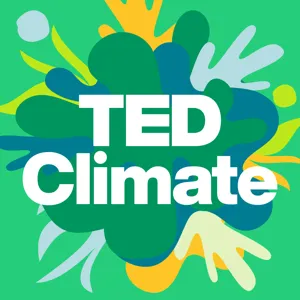Podcast Summary
Addressing methane emissions and streamlining work processes: Tackling methane emissions is vital for climate change mitigation. Tools like Canva and Slack can enhance work efficiency. Listen to 'Climate 1' for expert insights on climate change and take action to reduce emissions and improve productivity.
Addressing methane emissions is a crucial step in mitigating climate change, and technology exists to make this possible. Meanwhile, tools like Canva and Slack can help streamline work processes and save time. For those interested in understanding climate change further, the podcast "Climate 1" offers insightful conversations with experts and thought leaders. It's important to note that every 10 seconds, approximately 10,000 metric tons of climate warming gases are released into the atmosphere due to human activities. So, taking action, whether it's reducing methane emissions or adopting more efficient work practices, is essential. Additionally, staying informed about climate change through resources like "Climate 1" can help individuals make informed decisions and contribute to the global response.
Methane's Impact on Short-Term Warming: Methane, a minor greenhouse gas, has a greater short-term warming impact than CO2. Reducing methane emissions from human activities, especially in energy production, can have an immediate impact on slowing down warming and often pays for itself.
Methane, though only making up 1% of greenhouse gas emissions, has a more significant impact on warming in the short term than carbon dioxide (CO2), which makes up 99%. Methane's molecular structure allows it to absorb more energy per unit mass and form other greenhouse gases in the atmosphere. Although CO2 lingers in the atmosphere for a long time, methane only lasts for around a decade. Therefore, reducing methane emissions can have an immediate impact on slowing down the rate of warming. The good news is that we have the technology to cut methane emissions from human activities in half, particularly in the energy production sector, where most methane is produced. Not only is this an effective solution, but many of these measures also pay for themselves. It's crucial to address both CO2 and methane emissions to protect future generations and minimize the risks of worsening damages in the near term.
Methane Emissions from Natural Gas and Agriculture: Methane emissions from natural gas production and agriculture can offset climate benefits, but cost-effective solutions like fixing leaks and using new technologies exist to reduce them.
Despite the potential climate benefits of using natural gas instead of coal, methane emissions from natural gas production, transportation, and waste management are significant and can offset these benefits. However, there are cost-effective solutions to reduce these emissions, such as fixing leaks in oil fields and capturing methane from landfills. Technological advancements, including handheld instruments, aircraft sensors, drones, and satellites, are making it easier to detect and quantify methane emissions. In the agriculture sector, which is the largest contributor to methane emissions, new technologies are emerging to address this challenge. For instance, livestock are a major source of methane, and there are exciting new solutions on the horizon, such as feed additives and manure management systems, to reduce methane emissions from livestock farming. Overall, while the methane problem is complex, there are practical and cost-effective solutions that can make a significant impact on reducing methane emissions and mitigating climate change.
Reducing methane emissions for a sustainable future: Improving livestock feed, covering manure lagoons, using digesters, and managing rice production can reduce methane emissions, slow down climate change, and offer co-benefits like cleaner air, improved water management, and job creation.
Reducing methane emissions, a potent greenhouse gas, is essential for mitigating climate change and experiencing benefits in our lifetimes. This can be achieved through various means, including improving livestock feed to reduce methane production, covering manure lagoons and using digesters to capture methane, and managing rice production to prevent methane formation. These solutions not only help slow down the rate of warming but also offer co-benefits such as cleaner air, improved water management, and job creation. Governments, businesses, and individuals must take action now and make methane reduction a priority in their strategies to combat climate change and promote equity. This collective effort could lead to significant reductions in methane emissions, contributing to a more sustainable future for all.
The Importance of Reducing Methane Emissions in Combination with CO2 Reduction: Reducing methane emissions, especially from energy, waste, and agriculture, is crucial for preventing severe climate change impacts in the near term. Simultaneously, reducing CO2 emissions is essential for long-term climate stability.
Reducing methane emissions, when combined with efforts to cut carbon dioxide (CO2), is crucial for preventing temperatures from rising to levels that could cause a complete loss of Arctic summer sea ice. This isn't just important for polar communities and ecosystems, but for the entire world. Currently, speaking for almost 10 minutes has resulted in the emission of over 700,000 metric tons of climate warming gases, equivalent to the weight of 12 million people. Among these emissions, methane has the potential to warm the earth the most over the next decade. However, we know how to cut methane emissions in half from energy, waste, and agriculture right now. This is the "methane moment," as reducing methane is the most effective way to mitigate climate change risks in the near term. Meanwhile, reducing CO2 emissions is essential for reducing risks in the long term. In conclusion, it's necessary to address both methane and CO2 to ensure a safer future for ourselves and future generations.





